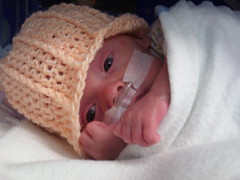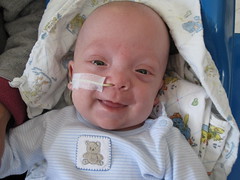Phrenology was a 19th-century fad that passed itself off as science. It is now long discredited; the relic of an era when real scientific advances and wonders were manifesting themselves and the public were still credulous enough to believe anything so long as it was dressed up as science. It was also an era before medicine had gotten a firm scientific footing, so it was not surprising that charlatans flourished in the then-empty intersection between science and medicine.
Phrenologists claimed to be able to determine personality traits, indeed, a patient's whole life story from the lumps on his skull. One man might be found to have the low, sloping brow of a congenital idiot and be deemed unfit for anything other than a lifetime of supervised toil under the watchful eyes of his betters.
So it is that when I see doctors, especially neurosurgeons, gently feeling Max's skull and making very carefully worded statements about his future prospects I can't seem to shake the image of a 19th century phrenologist at work.
Calling the neuro service "phrenologists" is just a little good-natured ribbing, maybe a defense mechanism. At best, it's a gentle reminder that while medicine has indeed made huge strides in the past century, there's still a lot about the human body, especially the human brain, that eludes therepeutic understanding.
I just learnt that the main character the movie Pi (a favorite) was a believer in phrenology; a fact that had escaped me the first time watching the movie. The main character's name, of course, was Max.
skip to main |
skip to sidebar

Max was born in October 2008 at Georgetown University Hospital. After more than four months at GUH, Max moved to the HSC Pediatric Center in March 2009. He came home six months after he was born, in April 2009.
A TUBE-FREE MORNING

Start Here: A list of posts with background information
- We're home! (leaving the hospital with Max)
- The hospital at home (what it's like to care for Max at home)
- Max in action (see Max do his tricks)
- How is Max? (update April 2009)
Most recent photos of Max
Blog Archive
-
▼
2008
(100)
-
▼
December
(69)
- Evening update (Wednesday 12/31)
- Evening update (Tuesday 12/30)
- Morning update (Tuesday 12/30)
- Max's first report card (Monday 12/29)
- Evening Update (Sunday 12/28)
- Playing Possum
- Evening update (Saturday 12/27)
- Max in the step-down NICU
- Late night update (Friday 12/26)
- Video of Max at the NIC unit on Christmas Day
- Max in his NICU crib
- Morning update (Thursday 12/25)
- Midday update (Wednesday 12/24)
- Morning update (Wednesday 12/24)
- Evening update (Tuesday 12/23)
- How the NICU has changed us
- Late night update (Monday 12/22)
- Evening update (Monday 12/22)
- Midday update (Monday 12/22)
- Afternoon update (Sunday 12/21)
- Evening update (Saturday 12/20)
- Evening Update (Friday 12/19)
- Evening Update (Thursday 12/18)
- Morning update (Thursday 12/18)
- Evening update (Wednesday 12/17)
- Late afternoon update (Wednesday 12/17)
- Mid-morning update (Wednesday 12/17)
- Morning update (Wednesday 12/17)
- Evening update (Tuesday 12/16)
- Afternoon update (Tuesday 12/16)
- Midday update (Tuesday 12/16)
- Bonus late-night post (12/15)
- Evening Update (Monday 12/15)
- Morning update (12/15)
- Evening update (Sunday 12/14)
- Max's new home, explained
- Afternoon update (Sunday 12/14)
- Evening update (Saturday 12/13)
- Morning update (Saturday 12/13)
- Guide to Max's new environment
- Late night update (Friday 12/12)
- What is the NICU like?
- P.S. (Thursday 12/11)
- Evening update (Thursday 12/11)
- Midday update (Thursday 12/11)
- Evening update (Wednesday 12/10)
- Midday update (Wednesday 12/10)
- Bonus head circumference post
- Evening update (Tuesday 12/9)
- Bonus update (Tuesday 12/9)
- Morning update (Tuesday 12/9)
- Phrenology
- Evening Update (Monday 12/8)
- Morning update (Monday 12/8)
- Evening update (Sunday, 12/7)
- Evening update (Saturday 12/6)
- Morning update (Saturday 12/6)
- Evening update (Friday 12/5)
- Midday update (Friday 12/5)
- Morning update (12/5)
- Evening update (Thursday, 12/4)
- How is Max?
- Morning update (Thursday 12/4)
- Evening update (Wednesday, 12/3)
- Midday update (Tuesday 12/3)
- Evening update (Tuesday 12/2): Some relief
- Midday update (Tuesday 12/2)
- Evening update (Monday 12/1)
- Midday update (Monday 12/1): Bring on the prune juice
-
▼
December
(69)



